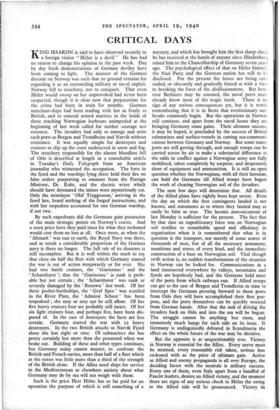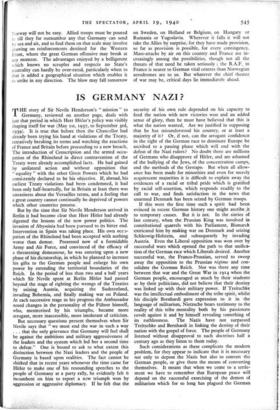CRITICAL DAYS
KING HAAKON is said to have observed recently to a foreign visitor " Hitler is a devil." He has had no reason to change his opinion in the past week. Day by day fresh demonstrations of German devilry have been coming to light. The manner of the German descent on Norway was such that no ground remains for regarding it as an outstanding military or naval exploit. Norway fell to treachery, not to conquest. That even Hitler would swoop on her unprovoked had never been suspected, though it is clear now that preparations for the crime had been in train for months. German merchant-ships had been trading with her as freely as British, and to conceal armed marines in the holds of those reaching Norwegian harbours unimpeded at the beginning of last week called for neither courage nor resource. The invaders had only to emerge and seize such ports as Bergen and Trondheim and Narvik without resistance. It was equally simple for destroyers and cruisers to slip up the coast undetected in snow and fog. The treachery responsible for the almost bloodless fall of Oslo is described at length in a remarkable article in Tuesday's Daily Telegraph from an American journalist who witnessed the occupation. The forts in the fjord and the warships lying there held their fire on false orders purporting to emanate from the Foreign Minister, Dr. Koht, and the electric wires which should have detonated the mines were mysteriously cut. Only the minelayer ' Olaf Tryggvason,' arriving in the fjord late, heard nothing of the forged instructions, and with her torpedoes accounted for one German warship, if not two.
By such expedients did the Germans gain possession of the main strategic points on Norway's coasts. And a stern price have they paid since for what they reckoned would cost them no loss at all. Once more, as when the Altmark ' was run to earth, the Royal Navy was there, and as result a considerable proportion of the German navy is there no longer. The full tale of its disasters is still incomplete. But it is well within the mark to say that close on half the fleet with which Germany started the war is out of action temporarily or for ever. She had two battle cruisers, the Gneisenau ' and the Scharnhorst '; that the Gneisenau ' is sunk is prob- able but not certain ; the Scharnhorst ' was sunk or severely damaged by the Renown ' last week. Of her three pocket-battleships, the Graf Spee ' was scuttled in the River Plate, the Admiral Scheer' has been torpedoed ; she may or may not be still afloat. Of her five heavy cruisers four are probably still intact. Of her six light cruisers four, and perhaps five, have been dis- posed of. In the case of destroyers the facts are less certain. Germany started the war with 22 heavy destroyers. In the two British attacks in Narvik Fjord alone she lost eight or nine. Of submarines she has pretty certainly lost more than she possessed when war broke out. Building of these and other types continues, but Germany today cannot muster, to confront the British and French navies, more than half of a fleet which at the outset was little more than a third of the strength of the British alone. If the Allies need ships for service in the Mediterranean or elsewhere anxiety about what Germany may do by sea will not weigh with them.
Such is the price Herr Hitler has so far paid for an operation the purpose of which is still something of a mystery, and which has brought him the first sharp check he has received at the hands of anyone since Hindenbur ; raised him to the Chancellorship of Germany seven year; ago. The psychological effect of that on Hitler himsel the Nazi Party and the German nation has still to l disclosed. For the present the losses are being con- cealed, or obscurely and gradually hinted at with a vier to breaking the force of the disillusionment, But huvk - ever Berliners may be cozened, the naval ports mus:: already know most of the tragic truth. There is no sign of any serious consequences yet, but it is worth remembering that it is in fleets that revolutionary out- breaks commonly begin. But the operations in Norway still continue, and apart from the naval losses they are bringing Germany some gains. Their ultimate success. it may be hoped, is precluded by the success of British submarines and surface-vessels in cutting sea-communi- cations between Germany and Norway. But some trans- ports are still getting through, and enough troops can he carried across by air to make a substantial difference to the odds in conflict against a Norwegian army not fully mobilised, taken completely by surprise, and desperately short of equipment and ammunition. It is still an open question whether the Norwegians, with all their heroism, can hold the Germans till Allied troops have begun the work of clearing Norwegian soil of the invaders.
The next few days will determine that. All details of the Allied plans have rightly been kept secret. Even the day on which the first contingents landed is not known, and statements as to where they landed may as easily be false as true. The laconic announcement of last Monday is sufficient for the present. The fact that by that date an expeditionary force was on Norwegian soil testifies to remarkable speed and efficiency in organisation when it is remembered that what is in question is the transport, not merely of some scores of thousands of men, but of all the necessary armament, munitions and stores of every kind, and the immediate construction of a base on Norwegian soil. Vital though swift action is, no sudden transformation of the situation in Norway can be looked for. Communications in a land intersected everywhere by valleys, mountains and fjords are hopelessly bad, and the Germans hold most of the ports from which railways run. If Allied troops can get to the east of Bergen and Trondheim in time to intercept the Germans pressing forward to those ports from Oslo they will have accomplished their first pur- pose, and the ports themselves can be quickly wrested from German hands. After that the task of driving the invaders back on Oslo and into the sea will be begun. The struggle cannot be anything but stern, and immensely much hangs for each side on its issue. If Germany is undisguisedly defeated in Scandinavia the effect on the whole future of the war may be decisive.
But the opposite is as unquestionably true. Victory in Norway is essential for the Allies. Every nerve must be strained, every reasonable risk taken, serious loss reckoned with as the price of ultimate gain. Active as Allied and enemy propaganda is all over Europe, the deciding factor with the neutrals is military success. Every one of them, even Italy apart from a handful of Fascist leaders, desires an Allied victory, and the moment there are signs of any serious check to Hitler the swing to the Allied side will be pronounced. Victory in Yorway will not be easy. Allied troops must be poured j till they far outnumber any that Germany can send by sea and air, and to find them on that scale may involve drawing on reinforcements destined for the Western Front, where the great German offensive may break at any moment. The advantages enjoyed by a belligerent hich knows no scruples and respects no State's neutrality can hardly be over-rated, particularly when to that is added a geographical situation which enables it to strike in any direction. The blow may fall tomorrow on Sweden, on Holland or Belgium, on Hungary or Rumania or Yugoslavia. Wherever it falls it will not take the Allies by surprise, for they have made provision, so far as provision is possible, for every contingency. Mass-attacks by air on this country and France are in- creasingly among the possibilities, though not all the threats of that need be taken seriously ; the R.A.F. in France is nearer to German vital centres than Norwegian aerodromes are to us. But whatever the chief theatre of war may be, critical days lie immediately ahead.











































 Previous page
Previous page